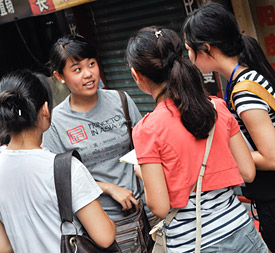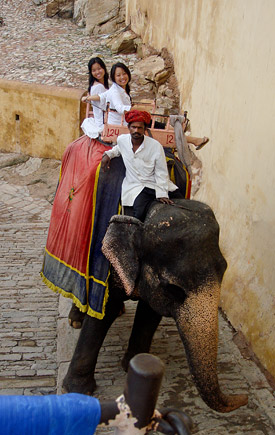From organizing an "Earth Week" celebration in China to learning about forest management in Thailand, and to helping with a community health program in India, several Princeton students this summer pursued service internships in Asia. The experiences of these students, as well as that of interns before them, have created lasting impressions and deepened their academic and personal goals.
The internships, which are sponsored through a partnership between Princeton in Asia (PiA) and the Princeton Environmental Institute (PEI), enable students to connect across cultures while pursuing hands-on service projects. With a key focus on environmental initiatives, the internships now are expanding to address health issues, always with an overall goal of bringing Princeton students into close collaboration with communities in countries in Asia.
The eight-week internships were conceived to "enable Princeton undergraduates to roll up their sleeves and dig in to real-world environmental challenges in a critical region of the world, thus enriching both the local communities and their undergraduate environmental education," said Kathy Hackett, associate director of PEI.
For rising junior and politics major Nikolai Kapustin, who taught English in China this summer while using environmental topics as a foundation for learning, the experience has given him a sense of accomplishment and anticipation for the future. "As the summer winds down, we are hopeful that our Chinese students are going to continue environmental discussions long after we have left," he said.

As part of the Greening Summer of Service program, rising junior Anne Tong (center) speaks with her students about the food cycle in Jishou. The internships bring students in close collaboration with the communities where they are based. (Photo courtesy of Christina Coll)
Since starting as a pilot joint venture between PEI and PiA in 2008, the program has offered internships in energy, forestry, environmental health, biodiversity conservation, environmental education and public health to 46 Princeton students across 19 academic disciplines. This summer, 14 students participated in programs in China, Thailand and India.
The partnership is part of the broader PEI/Grand Challenges internship program, which offers Princeton undergraduates an opportunity to explore and expand their knowledge of complex environmental issues with hands-on research experience during the summer months in 50 countries around the world. The University's multidisciplinary Grand Challenges Program focuses on climate and energy, development, and health. For its part, PiA has been building bridges between the United States and Asia for more than a century by arranging fellowships and internships with host communities in Asia in the fields of education, development, journalism and business.

Horse-trekking on the Tibetan Plateau is a highlight for students participating in the internship in China. (Photo courtesy of Christina Coll)
'Greening' Summer of Service in China
This summer, 11 students participated in Summer of Service (SoS) in China, one notable example of the collaboration between PEI and PiA. Summer of Service is a PiA flagship program through which Princeton students run an English summer program for aspiring English teachers in the city of Jishou in China's rural Hunan Province.
Three years ago, Princeton students launched "Greening Summer of Service," an initiative that introduced environmental programming into the curriculum to cultivate a dialogue with their Chinese students surrounding some of the significant environmental challenges facing China.
Over the past four summers, the Greening SoS program has reached nearly 400 Chinese student-teachers in Jishou. The Chinese students, working with Princeton students, have been inspired to launch a range of environmental protection projects in Jishou.
This summer, Princeton interns in Jishou turned the city's annual Earth Day celebration into an "Earth Week," working with their Chinese students to implement several environmentally friendly projects that they presented to the larger university community there. Local students took pictures of garbage and wrote poetry to accompany the images; others interviewed the city's garbage collectors to document the changes they have seen in the environment over the years and field their suggestions for the future. Another group produced environmental videos on topics from water conservation to the use of public transportation, and yet another group interviewed food vendors to understand the challenges of the food cycle in the city and identify ways residents could help improve the system.
"Our Chinese students recognize the environment as something to be protected, and yet they fully grasp the complications of creating change in China," Kapustin said. "From discussions on the merits and disadvantages of nuclear power to innovative ways to 'go green,' the normally high energy level of our students rises to a peak as they are given the opportunity to produce work they are proud of."

Cameron White (left), a member of the class of 2014, talks to a student in Jishou about different ways to recycle. The Princeton undergraduates worked with their students in China to implement several environmentally friendly projects, including celebrating an "Earth Week." (Photo courtesy of Christina Coll)
Beyond the impact on the community in Jishou, the Greening SoS program also continues to influence Princeton students after their return to campus. Wendy Lang, a rising junior in chemical and biological engineering who was an intern in 2010, said the opportunity enabled her to connect across cultures over shared environmental challenges.
"To be able to travel throughout China and compare the diversity of lifestyles in just one country alone, let alone on two different continents, was really eye-opening," Lang said. "Whether I'm in a classroom or walking around campus here in Princeton, it's been wonderful to be able to maintain a meaningful connection to SoS and another part of the world that reminds me of what we can do to educate each other and make a difference."
Jennifer Keeley, a member of the class of 2011 who spent two summers as a PEI/PiA intern and helped develop the environmental topics for the Greening SoS course, also emphasized the personal significance of the experience. "My students knew so little about China's environmental challenges, so to see immense damage around me and be able to contribute to the environmental education of the next generation was truly incredible," she said about her first internship at the end of her sophomore year. "That experience really galvanized my interest in environmental studies."
Going into her junior year, Keeley was energized to tackle the environmental challenges she had witnessed in China. She sought out classes that focused on environmental issues in the developing world, particularly on the role that policymakers and the government play in environmental protection, she said. The following summer, as a rising senior, she traveled as a PEI/PiA intern to Thailand where she worked on community forestry issues. By then she had decided to major in English, as well as pursue an environmental studies certificate through PEI.
Engaging with societal issues in Beijing and Bangkok
While the Greening SoS initiative flourishes in Jishou, PEI/PiA internships also have blossomed in other parts of China and elsewhere in Asia. Rising junior Iris Zhou, who is majoring in ecology and evolutionary biology, spent the summer at the National Resources Defense Council in Beijing, as an analysis and advocacy intern working on reducing environmental pollution from lead.
"Behind the staggering 10 percent annual growth in GDP that China has experienced in the last decade, the Chinese people have paid a steep price in their quality of life, and now they are worried about the safety of the food they are eating," she said.
Through this experience, Zhou said she developed an in-depth understanding of China's policies on heavy metals and helped the local government meet pollution remediation targets laid out by the Chinese government's environmental protection plan.

Xiang Ding (left), a rising junior, visits a village in rural Thailand as part of his internship in community forestry. Being able to connect across cultures is one of the most rewarding aspects of the internships. (Photo courtesy of Xiang Ding)
In Bangkok, rising junior Xiang Ding interned at the Center for People and Forests (RECOFTC), a nonprofit organization committed to the promotion of community-based management of forest resources in the Asia-Pacific region. Ding, an economics major, worked in RECOFTC's communications and marketing department, where he supported the organization’s marketing, web development and fundraising activities.
"The PEI/PiA internships provide opportunities for students like Iris and Xiang to learn how the environmental concerns they’ve studied in class affect communities throughout China, Thailand and India, and how local communities are addressing environmental challenges," said Anastasia Vrachnos, the executive director of PiA. "Such experiences have proven transformative for the interns' understanding of environmental issues and have impacted their course of undergraduate study, not to mention their appreciation of new cultural milieus, developing world challenges and spicy foods!"
Addressing health issues in India
For the first time this year, the range of student opportunities expanded to include public health internships in Asia.
Rising junior Dora Huang, an ecology and evolutionary biology major, was the program's first health intern. Over the summer, she worked in New Delhi with the NAZ Foundation, a small grass-roots nongovernmental organization that provides an extensive range of programs to local residents, from advocacy and networking to outpatient care and counseling. The foundation also serves as a care-home for 25 children living with HIV.

Rising junior Dora Huang (middle) finds time from her public health internship in India to ride an elephant. She said her internship allowed her to explore a range of activities and interests. (Photo courtesy of Dora Huang)
Huang, whose internship was one of 24 immersion experiences sponsored by the University's Health Grand Challenge, was based at the home for children and was responsible for general communications and programming. Huang said the experience helped her develop her interests on many levels.
"Ultimately, this internship allowed me to not only pursue my academic interests in anthropology, immunology, and the field of global and public health, but also to spend the summer exploring. To be able to live within the community that I hoped to affect, to gain experience in a realistic setting juxtaposing health practices, education, childcare and community outreach, to do something real with my summer -- that was amazing."
She added that her internship enabled her to obtain a firsthand look at some of the most innovative, grass-roots work being conducted in the field of HIV/AIDS prevention in India.
"Whether our students address health issues in India or air pollution in China, they come away from their summer internships with an enriched perspective on critical environmental issues in the context of world cultures and the global community," Hackett said. "These life-changing experiences are nurturing our students to become highly engaged and effective leaders who are focused on making the world a better place."







